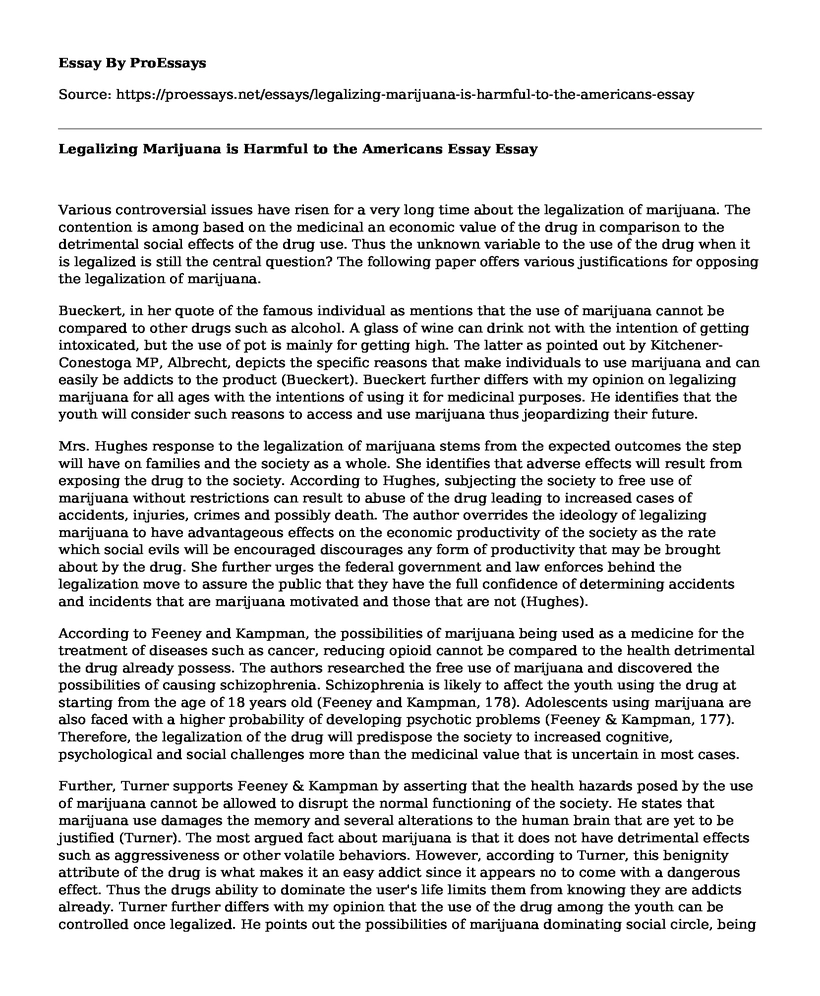Various controversial issues have risen for a very long time about the legalization of marijuana. The contention is among based on the medicinal an economic value of the drug in comparison to the detrimental social effects of the drug use. Thus the unknown variable to the use of the drug when it is legalized is still the central question? The following paper offers various justifications for opposing the legalization of marijuana.
Bueckert, in her quote of the famous individual as mentions that the use of marijuana cannot be compared to other drugs such as alcohol. A glass of wine can drink not with the intention of getting intoxicated, but the use of pot is mainly for getting high. The latter as pointed out by Kitchener-Conestoga MP, Albrecht, depicts the specific reasons that make individuals to use marijuana and can easily be addicts to the product (Bueckert). Bueckert further differs with my opinion on legalizing marijuana for all ages with the intentions of using it for medicinal purposes. He identifies that the youth will consider such reasons to access and use marijuana thus jeopardizing their future.
Mrs. Hughes response to the legalization of marijuana stems from the expected outcomes the step will have on families and the society as a whole. She identifies that adverse effects will result from exposing the drug to the society. According to Hughes, subjecting the society to free use of marijuana without restrictions can result to abuse of the drug leading to increased cases of accidents, injuries, crimes and possibly death. The author overrides the ideology of legalizing marijuana to have advantageous effects on the economic productivity of the society as the rate which social evils will be encouraged discourages any form of productivity that may be brought about by the drug. She further urges the federal government and law enforces behind the legalization move to assure the public that they have the full confidence of determining accidents and incidents that are marijuana motivated and those that are not (Hughes).
According to Feeney and Kampman, the possibilities of marijuana being used as a medicine for the treatment of diseases such as cancer, reducing opioid cannot be compared to the health detrimental the drug already possess. The authors researched the free use of marijuana and discovered the possibilities of causing schizophrenia. Schizophrenia is likely to affect the youth using the drug at starting from the age of 18 years old (Feeney and Kampman, 178). Adolescents using marijuana are also faced with a higher probability of developing psychotic problems (Feeney & Kampman, 177). Therefore, the legalization of the drug will predispose the society to increased cognitive, psychological and social challenges more than the medicinal value that is uncertain in most cases.
Further, Turner supports Feeney & Kampman by asserting that the health hazards posed by the use of marijuana cannot be allowed to disrupt the normal functioning of the society. He states that marijuana use damages the memory and several alterations to the human brain that are yet to be justified (Turner). The most argued fact about marijuana is that it does not have detrimental effects such as aggressiveness or other volatile behaviors. However, according to Turner, this benignity attribute of the drug is what makes it an easy addict since it appears no to come with a dangerous effect. Thus the drugs ability to dominate the user's life limits them from knowing they are addicts already. Turner further differs with my opinion that the use of the drug among the youth can be controlled once legalized. He points out the possibilities of marijuana dominating social circle, being used in organizations and children having the privilege of stealing pot that was to be their parent's (Turner). The scope of marijuana use, therefore, has the possibility of increasing to a greater extent if the drug is legitimized.
Conclusion
In a nutshell, the push and pull factors that are behind the opposition of legalizing marijuana carries a lot of weight, and they have to be considered keenly in policy formulation and implementation of the drug. The economic disadvantage, medical implications, and moral deterioration are among the major areas the society is likely to lose if the drug is legalized.
Works Cited
Bueckert Kate. Opposing sides concerned Trudeau failing Canadians with new pot laws. CBC News, Apr 18, 2017. Web. 8 July 2018
Feeney, Kathleen E., and Kyle M. Kampman. "Adverse effects of marijuana use." The Linacre Quarterly 83.2 (2016): 174-178.
Hughes P. Linda. "Your Opinions | Opposing views on California's marijuana legalization." The SanDiego Union Tribune. Dec 18th, 2017. Web. 8 July 2018
Turner Joseph. "How Legalizing Marijuana Will Hurt Americans Long-Term." The Federalist. March 31, 2017. Web. 8 July 2018.
Cite this page
Legalizing Marijuana is Harmful to the Americans Essay. (2022, Jun 20). Retrieved from https://proessays.net/essays/legalizing-marijuana-is-harmful-to-the-americans-essay
If you are the original author of this essay and no longer wish to have it published on the ProEssays website, please click below to request its removal:
- Alternative Solutions to "Three Strikes" Law Essay Example
- Essay Sample on US-China Trade War: Economic Turmoil & Impact on GDP
- Essay Example on Exploring Canadian and Indigenous Families: Intersectional Analysis
- Final Word on Legal Decisions: Supreme Court's Vital Role - Essay Sample
- Paper Example on National Immigration Policy: Who Should Regulate?
- Essay on Buddhism in Japan: Origins & Impact on Society
- Paper Example on Crime and Justice in Film: A Decade of Reflection







